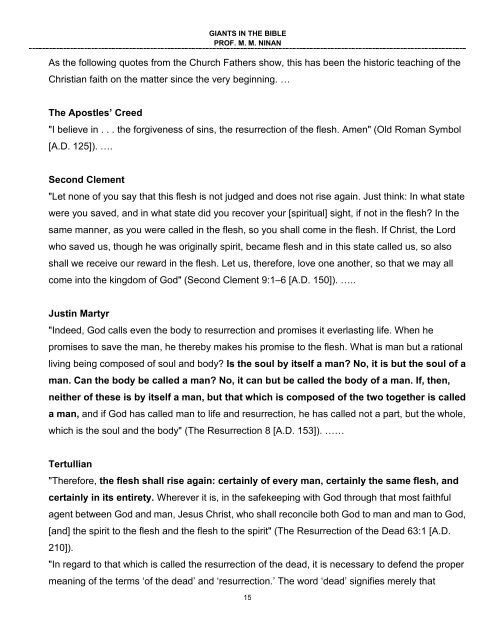Giants_in_the_Bible
Nephilims were on the earth, before and after the flood. Who are these giants? Were there other giant tribes and nations on the earth. How did they happen? A scriptural review on giants on earth.
Nephilims were on the earth, before and after the flood. Who are these giants? Were there other giant tribes and nations on the earth. How did they happen? A scriptural review on giants on earth.
Create successful ePaper yourself
Turn your PDF publications into a flip-book with our unique Google optimized e-Paper software.
GIANTS IN THE BIBLE<br />
PROF. M. M. NINAN<br />
As <strong>the</strong> follow<strong>in</strong>g quotes from <strong>the</strong> Church Fa<strong>the</strong>rs show, this has been <strong>the</strong> historic teach<strong>in</strong>g of <strong>the</strong><br />
Christian faith on <strong>the</strong> matter s<strong>in</strong>ce <strong>the</strong> very beg<strong>in</strong>n<strong>in</strong>g. …<br />
The Apostles’ Creed<br />
"I believe <strong>in</strong> . . . <strong>the</strong> forgiveness of s<strong>in</strong>s, <strong>the</strong> resurrection of <strong>the</strong> flesh. Amen" (Old Roman Symbol<br />
[A.D. 125]). ….<br />
Second Clement<br />
"Let none of you say that this flesh is not judged and does not rise aga<strong>in</strong>. Just th<strong>in</strong>k: In what state<br />
were you saved, and <strong>in</strong> what state did you recover your [spiritual] sight, if not <strong>in</strong> <strong>the</strong> flesh? In <strong>the</strong><br />
same manner, as you were called <strong>in</strong> <strong>the</strong> flesh, so you shall come <strong>in</strong> <strong>the</strong> flesh. If Christ, <strong>the</strong> Lord<br />
who saved us, though he was orig<strong>in</strong>ally spirit, became flesh and <strong>in</strong> this state called us, so also<br />
shall we receive our reward <strong>in</strong> <strong>the</strong> flesh. Let us, <strong>the</strong>refore, love one ano<strong>the</strong>r, so that we may all<br />
come <strong>in</strong>to <strong>the</strong> k<strong>in</strong>gdom of God" (Second Clement 9:1–6 [A.D. 150]). …..<br />
Just<strong>in</strong> Martyr<br />
"Indeed, God calls even <strong>the</strong> body to resurrection and promises it everlast<strong>in</strong>g life. When he<br />
promises to save <strong>the</strong> man, he <strong>the</strong>reby makes his promise to <strong>the</strong> flesh. What is man but a rational<br />
liv<strong>in</strong>g be<strong>in</strong>g composed of soul and body? Is <strong>the</strong> soul by itself a man? No, it is but <strong>the</strong> soul of a<br />
man. Can <strong>the</strong> body be called a man? No, it can but be called <strong>the</strong> body of a man. If, <strong>the</strong>n,<br />
nei<strong>the</strong>r of <strong>the</strong>se is by itself a man, but that which is composed of <strong>the</strong> two toge<strong>the</strong>r is called<br />
a man, and if God has called man to life and resurrection, he has called not a part, but <strong>the</strong> whole,<br />
which is <strong>the</strong> soul and <strong>the</strong> body" (The Resurrection 8 [A.D. 153]). ……<br />
Tertullian<br />
"Therefore, <strong>the</strong> flesh shall rise aga<strong>in</strong>: certa<strong>in</strong>ly of every man, certa<strong>in</strong>ly <strong>the</strong> same flesh, and<br />
certa<strong>in</strong>ly <strong>in</strong> its entirety. Wherever it is, <strong>in</strong> <strong>the</strong> safekeep<strong>in</strong>g with God through that most faithful<br />
agent between God and man, Jesus Christ, who shall reconcile both God to man and man to God,<br />
[and] <strong>the</strong> spirit to <strong>the</strong> flesh and <strong>the</strong> flesh to <strong>the</strong> spirit" (The Resurrection of <strong>the</strong> Dead 63:1 [A.D.<br />
210]).<br />
"In regard to that which is called <strong>the</strong> resurrection of <strong>the</strong> dead, it is necessary to defend <strong>the</strong> proper<br />
mean<strong>in</strong>g of <strong>the</strong> terms ‘of <strong>the</strong> dead’ and ‘resurrection.’ The word ‘dead’ signifies merely that<br />
15

















